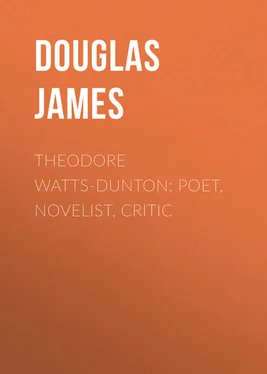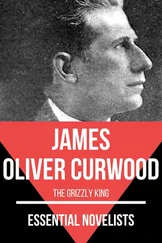James Douglas - Theodore Watts-Dunton - Poet, Novelist, Critic
Здесь есть возможность читать онлайн «James Douglas - Theodore Watts-Dunton - Poet, Novelist, Critic» — ознакомительный отрывок электронной книги совершенно бесплатно, а после прочтения отрывка купить полную версию. В некоторых случаях можно слушать аудио, скачать через торрент в формате fb2 и присутствует краткое содержание. Жанр: literature_19, foreign_antique, foreign_prose, Биографии и Мемуары, на английском языке. Описание произведения, (предисловие) а так же отзывы посетителей доступны на портале библиотеки ЛибКат.
- Название:Theodore Watts-Dunton: Poet, Novelist, Critic
- Автор:
- Жанр:
- Год:неизвестен
- ISBN:нет данных
- Рейтинг книги:4 / 5. Голосов: 1
-
Избранное:Добавить в избранное
- Отзывы:
-
Ваша оценка:
- 80
- 1
- 2
- 3
- 4
- 5
Theodore Watts-Dunton: Poet, Novelist, Critic: краткое содержание, описание и аннотация
Предлагаем к чтению аннотацию, описание, краткое содержание или предисловие (зависит от того, что написал сам автор книги «Theodore Watts-Dunton: Poet, Novelist, Critic»). Если вы не нашли необходимую информацию о книге — напишите в комментариях, мы постараемся отыскать её.
Theodore Watts-Dunton: Poet, Novelist, Critic — читать онлайн ознакомительный отрывок
Ниже представлен текст книги, разбитый по страницам. Система сохранения места последней прочитанной страницы, позволяет с удобством читать онлайн бесплатно книгу «Theodore Watts-Dunton: Poet, Novelist, Critic», без необходимости каждый раз заново искать на чём Вы остановились. Поставьте закладку, и сможете в любой момент перейти на страницу, на которой закончили чтение.
Интервал:
Закладка:
Imposteur à la Mecque et prophète à Mèdine.
Although in all probability Cromwell never lived at Slepe Hall, but at the Green End Farm at the other end of the town, there was a legend that, before the Ironsides started on a famous expedition, Noll went back to St. Ives and concealed his own plate, and the plate of all his rebel friends, in Slepe Hall cellars. No treasure turned up, but what was found was a collection of old bottles of wine which was at once christened ‘Cromwell’s wine’ by the local humourist of the town, who was also one of its most prosperous inhabitants, and who felt as much interest as the boys in the exploration. The workmen, of course, at once began knocking off the bottles’ necks and drinking the wine, and were soon in what may be called a mellow condition; the humourist, being a teetotaler, would not drink, but he insisted on the boys being allowed to take away their share of it in order that they might say in after days that they had drunk Oliver Cromwell’s wine and perhaps imbibed some of the Cromwellian spirit and pluck. Consequently the young urchins carried off a few bottles and sat down in a ring under a tree called ‘Oliver’s Tree,’ and knocked off the tops of the bottles and began to drink. The wine turned out to be extremely sweet, thick and sticky, and appears to have been a wine for which Cowslip Land has always been famous – elder wine. Abstemious by temperament and by rearing as Mr. Watts-Dunton was, he could not resist the temptation to drink freely of Cromwell’s elder-wine; so freely, in fact, that he has said, ‘I was never even excited by drink except once, and that was when I came near to being drunk on Oliver Cromwell’s elder-wine.’ The wine was probably about a century old.
I should have stated that Mr. Watts-Dunton at the age of eleven or twelve was sent to a school at Cambridge, where he remained for a longer time than is usual. He received there and afterwards at home a somewhat elaborate education, comprising the physical sciences, particularly biology, and also art and music. As has been said in the notice of him in ‘Poets and Poetry of the Century,’ he is one of the few contemporary poets with a scientific knowledge of music. Owing to his father’s passion for science, he was specially educated as a naturalist, and this accounts for the innumerable allusions to natural science in his writings, and for his many expressions of a passionate interest in the lower animals.
Upon the subject of “the great human fallacy expressed in the phrase, ‘the dumb animals,’” Mr. Watts-Dunton has written much, and he has often been eloquent about ‘those who have seen through the fallacy, such as St. Francis of Assisi, Cowper, Burns, Coleridge, and Bisset, the wonderful animal-trainer of Perth of the last century, who, if we are to believe the accounts of him, taught a turtle in six months to fetch and carry like a dog; and having chalked the floor and blackened its claws, could direct it to trace out any given name in the company.’
“Of course,” he says, “the ‘lower animals’ are no more dumb than we are. With them, as with us, there is the same yearning to escape from isolation – to get as close as may be to some other conscious thing – which is a great factor of progress. With them, as with us, each individual tries to warm itself by communication with the others around it by arbitrary signs; with them, as with us, countless accidents through countless years have contributed to determine what these signs and sounds shall be. Those among us who have gone at all underneath conventional thought and conventional expression – those who have penetrated underneath conventional feeling – know that neither thought nor emotion can really be expressed at all. The voice cannot do it, as we see by comparing one language with another. Wordsworth calls language the incarnation of thought. But the mere fact of there being such a Babel of different tongues disproves this. If there were but one universal language, such as speculators dream of, the idea might, at least, be not superficially absurd. Soul cannot communicate with soul save by signs made by the body; and when you can once establish a Lingua Franca between yourself and a ‘lower animal,’ interchange of feeling and even of thought is as easy with them as it is with men. Nay, with some temperaments and in some moods, the communication is far, far closer. ‘When I am assailed with heavy tribulation,’ said Luther, ‘I rush out among my pigs rather than remain alone by myself.’ And there is no creature that does not at some points sympathize with man. People have laughed at Erskine because every evening after dinner he used to have placed upon the table a vessel full of his pet leeches, upon which he used to lavish his endearments. Neither I nor my companion had a pet passion for leeches. Erskine probably knew leeches better than we, for, as the Arabian proverb says, mankind hate only the thing of which they know nothing. Like most dog lovers, we had no special love for cats, but that was clearly from lack of knowledge. ‘I wish women would purr when they are pleased,’ said Horne Tooke to Rogers once.”
Chapter III
THE CRITIC IN THE BUD
One of my special weaknesses is my delight in forgotten records of the nooks of old England and ‘ould Ireland’; I have a propensity for ‘dawdling and dandering’ among them whenever the occasion arises, and I am yielding to it here.
Besides the interesting history of St. Ives from which I have been compelled to quote so liberally, Mr. Norris has written a series of brochures upon the surrounding villages. One of these, called ‘St. Ives and the Printing Press,’ has greatly interested me, for it reveals the wealth of the material for topographical literature which in the rural districts lies ready for the picking up. I am tempted to quote from this, for it shows how strong since Cromwell’s time the temper which produced Cromwell has remained. During the time when at Cambridge George Dyer and his associates, William Frend, Fellow of Jesus, and John Hammond of Fenstanton, Fellow of Queen’s, revolted against the discipline and the doctrine of the Church of England, St. Ives was the very place where the Cambridge revolutionists had their books printed. The house whence issued these fulminations was the ‘Old House’ in Crown Street, now pulled down, which for a time belonged to Mr. Watts-Dunton’s father, having remained during all this time a printing office. Mr. Norris gives a very picturesque description of this old printing office at the top of the house, with its pointed roof, ‘king posts’ and panelling, reminding one of the pictures of the ancient German printing offices. Mr. Norris also tells us that it was at the house adjoining this, the ‘Crown Inn,’ that William Penn died in 1718, having ridden thither from Huntingdon to hear the lawsuit between himself and the St. Ives churchwardens. According to Mr. Norris, the fountain-head of the Cambridge revolt was the John Hammond above alluded to, who was a friend of Mr. Watts-Dunton’s father when the latter was quite a young man under articles for a solicitor. A curious character must have been this long-forgotten rebel, to whom Dyer addressed an ode, with an enormous tail of learned notes showing the eccentric pedantry which was such an infinite source of amusement to Lamb, and inspired some of Elia’s most delightful touches of humour. This poem of Dyer’s opens thus: —
Though much I love th’ Æolian lyre,
Whose varying sounds beguil’d my youthful day,
And still, as fancy guides, I love to stray
In fabled groves, among th’ Aonian choir:
Yet more on native fields, thro’ milder skies,
Nature’s mysterious harmonies delight:
There rests my heart; for let the sun but rise,
What is the moon’s pale orb that cheer’d the lonesome night?
I cannot leave thee, classic ground,
Nor bid your labyrinths of song adieu;
Yet scenes to me more dear arise to view:
And my ear drinks in notes of clearer sound.
No purple Venus round my Hammond’s bow’r,
No blue-ey’d graces, wanton mirth diffuse,
The king of gods here rains no golden show’r,
Nor have these lips e’er sipt Castilian dews.
Интервал:
Закладка:
Похожие книги на «Theodore Watts-Dunton: Poet, Novelist, Critic»
Представляем Вашему вниманию похожие книги на «Theodore Watts-Dunton: Poet, Novelist, Critic» списком для выбора. Мы отобрали схожую по названию и смыслу литературу в надежде предоставить читателям больше вариантов отыскать новые, интересные, ещё непрочитанные произведения.
Обсуждение, отзывы о книге «Theodore Watts-Dunton: Poet, Novelist, Critic» и просто собственные мнения читателей. Оставьте ваши комментарии, напишите, что Вы думаете о произведении, его смысле или главных героях. Укажите что конкретно понравилось, а что нет, и почему Вы так считаете.









